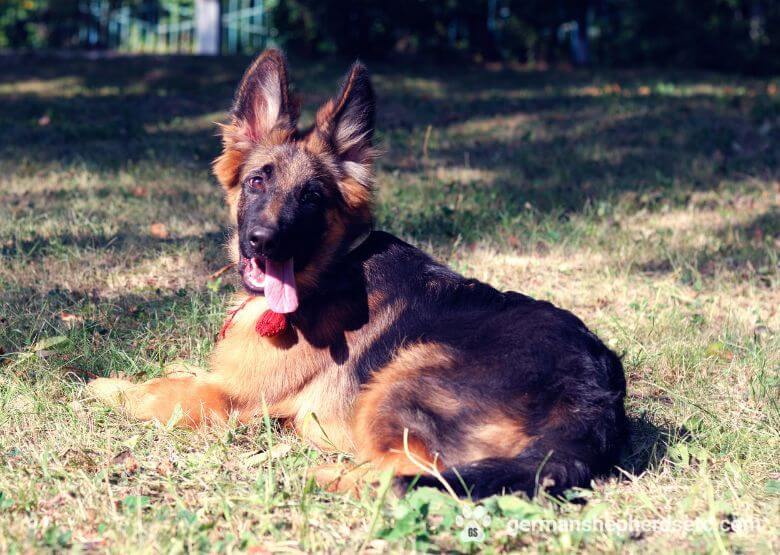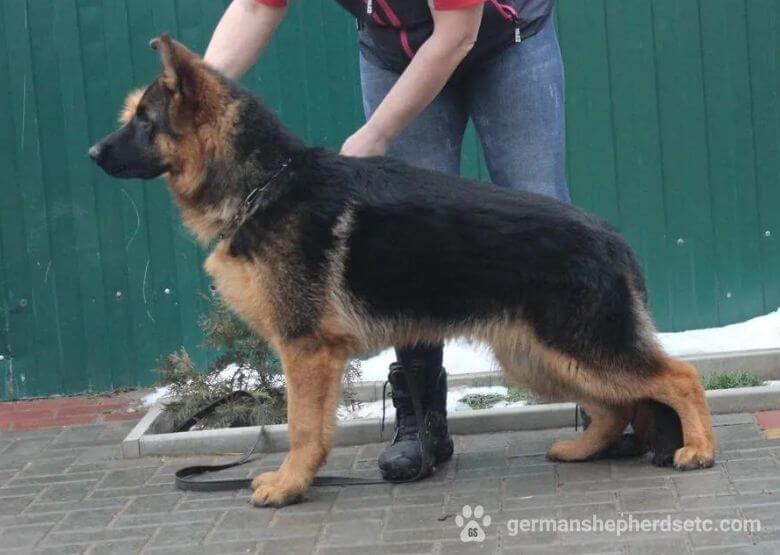Table of Contents
7 months is the time when your cute fluffy cub turns into a naughty and disobedient teenager. Hormones take a crucial place in your 7 month old German Shepherd’s behavior at this age. That is why get prepared to set appropriate corrections if you want to shape your pet’s health condition and personality for the rest of its life.
Here, we have collected some tips and explanations that will help you deal with a lot of challenges the first month of adolescence imposes on a Shepherd and its owner. We hope our advice will be useful.
Size and Appearance
Before your German Shepherd is 7 months old, it gains about half of its adult size and up to 30% of its grown-up weight.
If we speak about the dog’s height at the withers, a male German Shepherd is 19-20 inches (48-50 cm) tall, and a female is about 17-19 inches (43-48 cm) tall. As for a German Shepherd’s 7 month old weight, males can gain up to 57-62 pounds (26-28 kg), and females are a bit lighter – 49-53 pounds (22-24 kg). Your puppy starts getting the right appearance of an adult German Shepherd dog.
German Shepherds usually have 42 adult teeth at this age, and their coats complete the two necessary layers. The overall growth, however, slows down. The ears are fully standing in most cases at this age. Nevertheless, some dogs may have floppy ears until they are one year old. You may even think about taping. Anyway, you need to talk to your vet to ensure your pup really needs it.
The sexual maturity of your doggy started not long ago, probably, in the last month. The animal will be developing its sexual behavior during the following two or three months. Make dogs, led by their hormones, start looking for a mate. This is a very responsible time because you need to keep your pup away from other dogs, especially stray ones. Even if you are walking with your pet along the street or in the park, keep an eye on other animals in the neighborhood.
The time is pretty rewarding for training and learning. However, considering the physical aspects of your dog’s development is essential.
Activity and Behavior
Physically, your German Shepherd of 7 months is not a puppy anymore. However, mentally it is, you can face many behavioral problems you have never seen before in your pet. Something can be even risky and inconvenient. Your doggy can start barking unexpectedly without any reason. It can try some bossy and disobedient things. It will chew everything it can reach and cause numerous accidents around your household.
Nevertheless, it is a natural behavior for a pup with high hormone levels that are constantly changing. Therefore, it is a pretty responsible time for serious work with your furry pet. If you continue to pay much attention to its behavior, by its one year of age, you will receive the doggy of your dream.
There is one more issue you may encounter with your pet. It is called “resource guarding.” Your German Shepherd won’t allow anyone to touch its things, including bowls, food, toys, or blankets. It will growl or snarl at you, your friends, family, or other animals who may try to approach, touch, or take away its belongings. You must do your best to stop this behavior as soon as possible, or your dog will show aggression toward other people or animals in public places. So, try to keep your pup away from dog parks at this age and continue socializing.
You have to be very patient, anyway, because your 7 month old German Shepherd is a very energetic dog, so it always needs to stay busy. Your pup is extremely intelligent at this age, too. It can remember up to 150 words, so teaching commands now is very easy.

Don’t allow it to get bored and demonstrate its destructive behavior. Your doggy needs at least 35 minutes of intensive exercise every day. One long walk or two short ones per day will do a lot of good to it. However, do not overload your puppy with physical activities. Its skeletal system is developing, so it is easy to damage its bones and joints at this age. You can also add the daily playtime activities and obedience training for at least 5-10 minutes per day to keep your pup engaged.
You may encounter another “fear” period in your dog, too. Try to be patient, rewarding, and understanding. Buy some safe and interesting toys for your pet to distract its attention from stressful factors. They need to be durable, too. Such things as kong toys, nylabones, and rope toys are quite effective. Kong toys are made of rubber and can be filled with food or treats. They also distract doggies from chewing household belongings. Nylabones are not chewable. They are made of plastic, and they are interesting to play with. Rope toys are a good source of stimulation, and they teach doggy interaction. So, your puppy will always be kept busy and entertained.
Your dog will also need around 8-10 hours of sleep at night at this age. However, there is no exact time your pup may want to nap. It can sleep about 18-20 hours on average per day, which is considered a norm. Though there are some variations, you do not need to worry if your pet sleeps less or more.
Health and Care
Your 7 month old GSD does not normally suffer from any health problems. All three necessary vaccinations should have been received by this age. The next DHPP and rabies vaccines are usually administered when a doggy is one year old. You only have to care about your dog’s height and weight. Practice measuring your pup once a month to know for sure that your pet is growing properly.
Some veterinarians recommend spaying or neutering the dog at this age. However, most specialists have already agreed that it is too early and you need to wait until the animal is one year old. It can be challenging for females because they can go into heat at this age. Though, try to postpone this medical procedure for as long as possible. Early neutering or spaying may lead to the development of hip dysplasia because the dog continues growing, and hormones play a great role in it.
You do not need to worry about your doggy’s health and care. Proper nutrition and exercise are the main things that should be your focus at this time. Such diseases as arthritis, myelopathy, allergies, cataracts, diabetes, and others can display after 5 years of age. Nevertheless, it is good if you take advantage of a DNA test to learn more about possible future problems and health conditions. For example, degenerative myelopathy is a genetic issue that can be detected by this test.
However, you need to be careful about such possible symptoms as heavy breathing, coughing, sneezing, itching, skin redness, a running nose and eyes, loss of appetite, diarrhea, vomiting, loss of weight, hard or excessive urination, drinking too much water, swollen or red gums, irregular sleep, and behavioral or personality changes. These symptoms may not mean any serious disease. However, you need to show your pup to the vet immediately when you notice something like that.
The other recommendations for taking care of your German Shepherd of 7 months are the following:
- regular deworming and getting rid of other parasites;
- regular hydration by providing a stable supply of fresh water;
- arranging a cozy place for sleeping, for example, a crate;
- fur brushing several times per week during the usual seasons and every day during high-shedding seasons in spring and autumn;
- nail trimming and teeth cleaning not more seldom than at least once a month;
- keeping your pet away from any dangerous neighborhood or stray dogs.
You may get some other, more individual recommendations from your vet. They can refer to specific diet or care needs.
Feeding
Correct feeding patterns are very important for your German Shepherd 7 month old puppy. It continues gaining weight and growing, so a healthy diet plays a great role in its development. You need to ensure that you offer your pet a proper number of calories and enough protein to support the health of its growing bones, joints, and muscles.
There are two ways to feed your young doggy – an all-natural diet and ready-made kibble of the highest quality. If applied properly, both methods have their advantages. The natural diet should have enough lean meats, like fish, turkey, or chicken, that are rich in protein. It can also include some vegetables and fruit, such as pumpkin, peas, carrots, bananas, apples, blueberries, and others. Some fruits and vegetables are not recommended because they can even be toxic to your puppy. You also have to avoid too many treats while training. The treats should also be lean and non-fatty. Too much fat and sugar can cause obesity. The latter leads to many health issues, such as hypertension, diabetes, arthritis, and even cancer. The minus of the natural diet is that it can be rather expensive.
Feeding your pup with high-quality kibble is a great solution if you need to be on a budget or don’t have much time to prepare homemade food. Your doggy needs 2-3 cups per day, with 2 meals – in the morning and in the evening. You have to be very accurate about the feeding times. You should feed your pet at set hours and remain consistent about it. It is also essential not to overfeed your German Shepherd. The consequences can be drastic – obesity, elbow-and-hip dysplasia, diabetes, heart issues, cancer, and many others.
Training
Obedience training is essential at this age. Reward your pup for its good behavior, and pat, and praise it whenever possible. You skip traits further on in the process of training and use only verbal stimuli as the main reinforcement. Train obedience in different environments. It will let your puppy make generalizations about the proper behavioral patterns in different situations.
If you treat your pet positively while training, it will help establish closer bonds with your pup. However, remember that your German Shepherd has a short attention span at this age, so it can quickly become bored or inattentive. 10-15 minutes is the maximum you can spend on any kind of training.
You must be patient and never use any sort of punishment if your doggy makes mistakes or cannot follow some commands. Use only positive reinforcement. However, you have to be strict and consistent enough. Stop the unwanted behavioral patterns at once.

Training has to be fun for your pet, so regular lessons in the form of games will do a lot of good.
Your 7 month old German Shepherd’s behavior is already regulated by different patterns. Your doggy knows that biting is bad, has gone through potty and crate training, and was properly socialized. It should have been socialized by this time, or you may face a lot of challenges now. Start immediately if you haven’t done anything about that before because you cannot properly socialize a German Shepherd who is more than 16 weeks old. Your pet should know at least 5 basic obedience commands and 2 more complicated commands by this time. You can consider teaching it at least two more advanced commands every month since the present moment.
Your German Shepherd may want to show up, be bossy, display aggression, or ignore what you order it to do because of hormonal changes. So, you need to be very consistent. You have to show it that you are the “leader of the pack.” However, never urge your doggy to obey commands by force, aggression, or beating. The results can be pretty undesirable.
FAQ
How much should a 7 month old German Shepherd weigh?
The weight parameters may differ in various dogs at this age. Though, the average weight is 57-62 pounds (26-28 kg) for males and about 50 pounds (23 kg) for females.
How much does a 7 month old German Shepherd sleep?
A German Shepherd dog needs at least 8-10 hours of sleep per night. Though, it can also sleep in the daytime. Therefore, the average sleeping time per day can be about 18-20 hours. There may also be some variations, which are also considered normal.
How much exercise should a 7 month old German Shepherd get?
The best method to count how much time your GSD needs for exercise per day is to add 5 minutes to every next month. If you multiply 5 by 7, you get 35 minutes per day. The exercise has to include walking, running, playing, and obedience training. Don’t overuse exercise because your puppy should not be too tired after it. If the pup is exhausted, think about reducing the time, or you may get some health issues in your pet soon.
Final Thoughts
Your 7 month old German Shepherd can bring a lot of fun and joy to your life. However, you need to be sure that you can offer it a lot of care, exercise, and activities because such puppies are strong, energetic, and lively. They need to be busy all day long, or they can become bored or aggressive.
This age in your dog can be rather stressful for you. It needs a lot of obedience training, too. Appropriate socialization is key to overcoming difficulties and bad habits caused by hormonal changes and disbalances at this age. You need to be very patient and consistent in teaching your doggy how to behave properly among other pets and people.
Mental training is also necessary for your pet. Choose suitable toys for it to distract them from boredom and destructive chewing. Ask your vet if you see any undesirable features or symptoms in your doggy. Most of them are caused by hormones, and the behavior or physical condition will improve up to one year of age. Others may be signals of some health issues. So never ignore them if you want to spend a lot of enjoyable time with your healthy, clever, and obedient furry friend.
